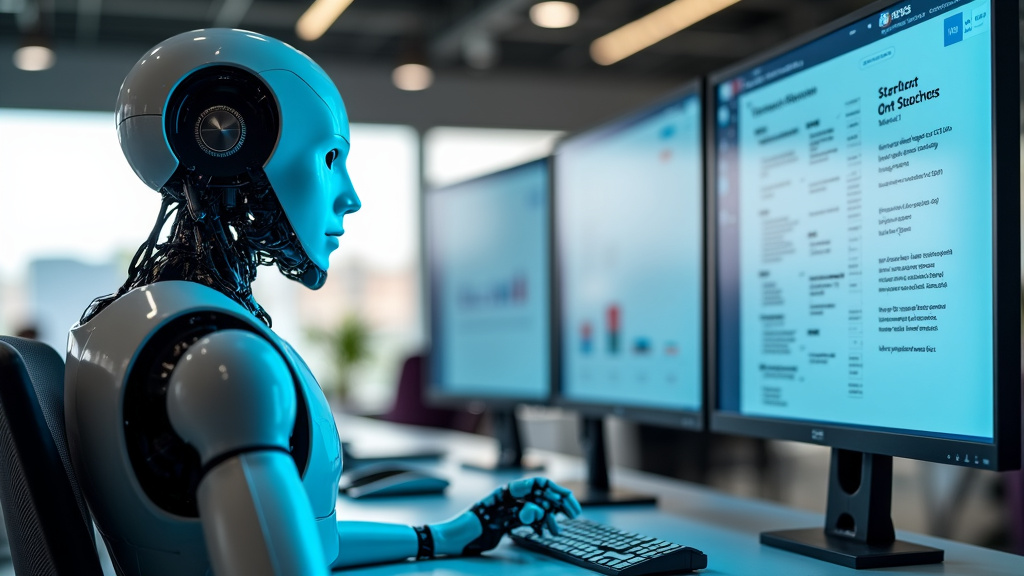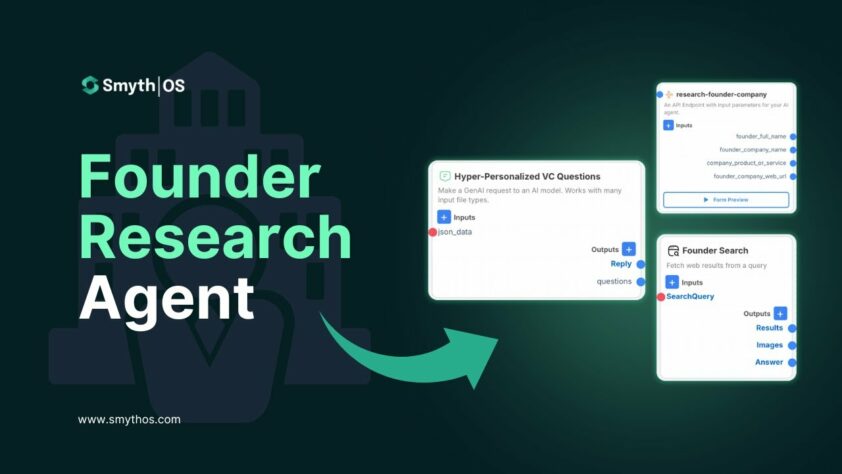The entrepreneurial landscape is experiencing a significant transformation. Artificial intelligence has become the catalyst reshaping how founders, investors, and business analysts conduct startup research—cutting through data overload to uncover actionable intelligence in minutes rather than weeks.
In 2023, generative AI and AI-related startups secured nearly $50 billion in funding, leading to an explosion of advanced tools that streamline the traditionally labor-intensive process of market analysis and opportunity evaluation. This is not merely an incremental improvement; it’s a fundamental redesign of how entrepreneurial research occurs. Entrepreneurs who previously spent countless hours analyzing databases and reports now use AI to quickly synthesize patterns, identify trends, and generate comprehensive insights.
The implications extend beyond convenience. AI acts as a virtual co-founder for many entrepreneurs, managing everything from market analysis to competitive research, allowing founders to concentrate on their unique value propositions. This democratization of business intelligence enables solo entrepreneurs to access the same quality of research insights that were once available only to well-funded ventures with dedicated analysis teams.
How Does AI Streamline the Startup Research Process?


The startup landscape requires quick, accurate research for decision-making, but traditional methods often consume excessive time and resources. AI tools now transform this process, offering unprecedented efficiency and depth in gathering market intelligence.
Real-Time Data Processing with DeepSearch
Grok 3’s DeepSearch represents a significant leap forward in AI-powered research capabilities. Unlike conventional search tools, DeepSearch acts as an intelligent reasoning-based engine that explains its thought process when interpreting queries and formulating responses. This makes it exceptionally valuable for startups needing to verify facts and synthesize complex market information.
The technology scans the internet in real-time, allowing founders to access current data rather than relying on potentially outdated information. While it occasionally struggles with irrelevant information, its ability to consolidate findings from multiple sources provides a more comprehensive view than traditional research methods.
Benchmark tests suggest DeepSearch outperforms competitors in math, science, and coding-related research—critical areas for tech startups evaluating market opportunities or technical feasibility of new ventures.
Meeting Insights and Analysis via Fathom
For startups constantly engaged in meetings with potential investors, partners, and customers, Fathom AI offers powerful capabilities that transform how teams capture and analyze qualitative data. The platform specializes in processing interview and focus group content, creating accurate transcriptions and insightful summaries.
Researchers can leverage Fathom to extract and analyze data from stakeholder conversations without the typical manual effort. This automation allows founders to focus on strategic thinking rather than note-taking and transcription, ensuring no valuable insights are missed during critical discussions.
The tool’s summarization features enable efficient extraction of key points from hours of conversations, compressing research time while maximizing data quality.
Competitive Intelligence and Market Analysis
AI research tools excel at scanning vast amounts of competitive data to identify patterns human researchers might miss. For startups mapping their competitive landscape, these tools can systematically analyze customer reviews, product features, pricing strategies, and marketing messaging across dozens of competitors.
What might take a human researcher weeks to compile can be assembled in hours, with AI highlighting noteworthy trends, potential market gaps, and competitive vulnerabilities. This acceleration doesn’t just save time—it fundamentally changes how thoroughly startups can understand their market position.
The combination of broader data collection and deeper analysis enables founders to make more informed strategic decisions based on comprehensive market intelligence rather than limited samples.
| Tool | Depth of Research | Usability | Report Readiness | Continuous Research Capabilities | Strengths | Limitations |
|---|---|---|---|---|---|---|
| ChatGPT Deep Research | High depth and reasoning | Simple interface, minimal interaction during process | Cohesive report-style response | Allows follow-up questions in chat | Analytical power, structured output | Costly, limited availability |
| Google Deep Research | Wide coverage, up-to-date info | User-friendly, integrated with Google ecosystem | Formatted report, easy export to Google Docs | Supports conversational refinement | Comprehensive info gathering, multi-language support | May lack deep analytical reasoning |
| Perplexity Deep Research | Efficient, quick retrieval of key info | Minimal learning curve, web-based interface | Detailed answers with source citations | Supports follow-up questions | Free for light use, source transparency | May require manual integration of results |
| Kompas AI | Structured, iterative depth | Structured workflow, editing tools | Long-form report, exportable formats | Project-centric, supports continuous refinement | Report-focused, user-guided process | May feel overkill for simple queries |
| Elicit | Remarkable depth for academic questions | Efficient for researchers, info-dense output | Provides data and citations, not narrative report | Allows systematic research, saves query results | Handles academic literature rigorously | Limited to scholarly sources, lacks narrative output |
Building Custom Research Workflows
Perhaps most transformative is the ability to design custom AI agents tailored to specific research questions. Rather than using generic tools, startups can now create purpose-built research assistants that understand their industry terminology, follow company-specific research methodologies, and integrate with existing data systems.
These customized agents become increasingly valuable over time as they learn from interactions and refine their understanding of the business context. A fintech startup, for instance, might develop an agent specialized in regulatory research across different markets, while a consumer brand might create one focused on sentiment analysis.
The efficiency gains are substantial—many startups report 30% reductions in research time while simultaneously increasing relevant information discovery by up to 50%.
Advanced Processing and Multi-Step Reasoning
Modern AI research tools leverage specialized modes for tackling different types of questions. Grok 3, for example, offers both “Think Mode” for breaking down simpler queries and “Big Brain Mode” for multi-step problem solving. These capabilities make AI particularly effective for startups facing complex market questions requiring nuanced analysis.
When evaluating market entry strategies or investment opportunities, these reasoning capabilities help startups consider multiple variables and potential outcomes. Rather than simply collecting data, AI can now assist in interpreting it through logical frameworks, identifying risks and opportunities human analysts might overlook.
This approach transforms research from a data gathering exercise into a more sophisticated analytical process that supports better strategic decisions.
Key AI Applications for Startup Evaluation


Artificial intelligence is changing how startups are evaluated and operate. From identifying new market opportunities to streamlining internal processes, AI applications provide powerful tools for investors assessing potential investments and founders building their companies.
Identifying Market Opportunities
AI excels at processing vast amounts of market data to identify patterns and opportunities that human analysts might miss. Advanced algorithms can analyze consumer behavior, industry trends, and competitive landscapes to pinpoint underserved market segments with growth potential.
For investors, these tools offer a more comprehensive view of a startup’s total addressable market (TAM) and growth trajectory. Instead of relying solely on founder-provided projections, AI can validate market claims with real-time data and predictive modeling, reducing investment risk.
Startups using this technology can pivot their business models based on objective market intelligence rather than subjective hunches, potentially shortening their path to product-market fit. For instance, an AI-powered platform might reveal that a healthcare startup’s technology has unexpected applications in adjacent industries like fitness or workplace safety.
Operational Automation
The operational demands on early-stage startups can be overwhelming, with limited resources stretched across multiple functions. AI offers solutions for automating repetitive tasks, from data entry and financial reporting to customer onboarding and support.
AI-powered tools can process routine paperwork, manage inventory, handle basic customer inquiries, and generate reports. This automation allows startup teams to focus on strategic initiatives rather than administrative burdens. For example, a logistics startup could use AI to automate shipment tracking and notifications, enabling staff to concentrate on improving supply chain efficiency.
Investors increasingly view a startup’s ability to leverage automation as a sign of operational maturity and scalability. Companies that effectively deploy AI for back-office functions often demonstrate better unit economics and more efficient paths to growth.
Personalized Customer Experiences
AI enables startups to deliver personalized experiences without the large customer service teams typically required. Machine learning algorithms can analyze individual user preferences, behaviors, and needs to customize product features, content, and interactions in real-time.
This personalization capability creates a compelling competitive advantage, especially for consumer-facing startups. E-commerce platforms using AI recommendation engines routinely see higher conversion rates and larger average order values. Similarly, content platforms leveraging AI personalization typically report stronger user engagement metrics and retention rates.
For investors, evidence of effective AI-driven personalization suggests a startup’s potential for establishing sustainable customer relationships and building defensible moats around their business. The ability to create individualized experiences at scale often translates to higher customer lifetime value—a key metric in startup valuation.
Data-Driven Marketing Optimization
AI has revolutionized marketing for resource-constrained startups by making sophisticated campaign optimization accessible without large teams or budgets. Machine learning models can predict which messages will resonate with specific audience segments, identify the optimal channels for distribution, and continuously refine targeting parameters based on performance data.
These capabilities allow startups to compete with established players by allocating their limited marketing resources more efficiently. Rather than relying on broad demographic targeting, AI enables precise customer acquisition strategies focused on the most promising prospects.
From an investor perspective, startups demonstrating AI-powered marketing efficiency typically show more sustainable customer acquisition costs (CAC) and clearer paths to profitability. The ability to leverage data for marketing optimization often indicates a founder team with strong analytical capabilities and a growth mindset.
Accelerated Product Development
AI is transforming how startups conceptualize, design, and refine their products. Machine learning algorithms can analyze user feedback, usage patterns, and feature adoption rates to provide actionable insights for product teams. This data-driven approach reduces guesswork in the development process.
AI-powered testing tools can simulate thousands of user interactions before a product reaches customers, identifying potential issues earlier in the development cycle. For software startups, AI-assisted coding platforms can accelerate development timelines by automating routine programming tasks and suggesting optimizations.
Investors increasingly value startups that leverage AI for product development, as these companies often demonstrate faster innovation cycles and more responsive product evolution. The ability to rapidly iterate based on user data typically leads to stronger product-market fit and more efficient use of development resources.
For those looking to build or invest in the next generation of innovative companies, understanding these key AI applications isn’t just advantageous—it’s essential. Platforms like SmythOS are making these powerful AI capabilities more accessible to startups of all sizes, democratizing access to tools that were once available only to enterprises with substantial resources.
How Can Founders Leverage AI for Competitive Intelligence?


Staying ahead of the competition is essential for survival. AI-powered competitive intelligence has become crucial for founders who need to analyze markets, identify opportunities, and anticipate competitive threats with remarkable speed and accuracy.
Competitive intelligence once required countless hours of manual research. Now, AI tools can process vast data sets to uncover valuable insights that would be impossible for human researchers to identify alone. This shift represents a significant transformation in how founders approach market analysis.
Mining Competitive Insights at Scale
AI excels at handling the volume of competitive intelligence. These systems can continuously monitor competitor websites, social media, press releases, and customer reviews across multiple sources simultaneously. AI not only collects data but also identifies patterns and highlights significant shifts that might indicate new strategic directions.
For example, an AI system can analyze changes in a competitor’s product pricing, marketing language, or customer sentiment, flagging these shifts for founder attention. This automated monitoring creates a comprehensive competitive dashboard that remains continuously updated without manual intervention.
According to industry research, 64% of B2B marketers already consider AI invaluable in their marketing efforts, with competitive intelligence being a key application. The technology can help founders respond more rapidly to market changes and identify white space opportunities that deserve immediate attention.
From Data Collection to Strategic Insight
The true power of AI for competitive intelligence lies in its ability to transform raw data into actionable insights. Modern AI systems don’t just gather information—they analyze competitor strengths and weaknesses, identify market gaps, and even predict potential moves based on historical patterns.
AI tools can perform detailed analyses that would be prohibitively time-consuming for humans:
- Tracking competitor product developments and feature updates
- Analyzing pricing strategies and promotional patterns
- Monitoring hiring trends that might signal new directions
- Assessing customer sentiment through review analysis
- Identifying shifts in marketing messaging and positioning
This depth of analysis enables founders to make more informed strategic decisions, whether that means adjusting pricing strategies, prioritizing certain product features, or identifying new market opportunities.
Multi-Agent Orchestration for Comprehensive Coverage
For founders seeking the most sophisticated competitive intelligence capabilities, multi-agent AI systems represent the cutting edge. These systems deploy specialized AI agents, each focused on different aspects of competitive analysis, working in concert to create a comprehensive view of the market landscape.
A well-designed multi-agent system might include:
- Market Trend Agents that analyze broad industry shifts and emerging technologies
- Competitor Monitoring Agents focused on tracking specific competitors’ activities
- Customer Sentiment Agents that analyze reviews and social media to gauge satisfaction with competitor offerings
- Pricing Intelligence Agents that track and analyze pricing strategies across the market
- Messaging Analysis Agents that identify shifts in how competitors position themselves
The power of this approach comes from the coordination between these specialized agents, which can share insights and collectively build a more nuanced understanding of the competitive landscape than any single system could achieve.
Real-World Applications for Founders
Startups across sectors are already leveraging AI for competitive intelligence with impressive results. In e-commerce, AI helps track competitor pricing strategies in real-time, enabling dynamic price adjustments. SaaS founders use AI to monitor competitor feature releases and customer feedback, helping prioritize their own development roadmaps.
Financial technology startups employ AI to analyze competitor financial products and identify underserved market segments. Healthcare innovators leverage AI to track regulatory approvals and patent filings, giving them early insights into competitor R&D directions.
| AI Agent Type | Function | Example |
|---|---|---|
| Simple Reflex Agent | Responds to current input using condition-action rules. | Spam filter bot |
| Model-Based Agent | Uses internal models to map environment. | Self-driving car systems |
| Goal-Based Agent | Acts to fulfill defined objectives. | Route optimization in logistics |
| Utility-Based Agent | Selects actions to maximize utility. | Investment decision AI tools |
| Learning Agent | Adapts using feedback and learning algorithms. | Personalized e-learning bots |
Implementation Strategies for Founders
For founders looking to implement AI-powered competitive intelligence, a strategic approach is essential. Start by identifying your most critical competitive intelligence needs—whether that’s product development insights, pricing intelligence, or marketing positioning analysis. Begin with focused AI tools addressing these specific needs before expanding to more comprehensive systems.
Consider the data sources most relevant to your industry. If customer reviews provide crucial insights, prioritize sentiment analysis capabilities. If competitor product features drive your market, focus on systems that excel at product comparison and feature tracking.
Remember that AI competitive intelligence tools are most effective when they complement human strategic thinking rather than replace it. The most successful implementations combine AI’s ability to process vast amounts of information with founders’ industry expertise and strategic vision.
The Future of AI-Powered Competitive Intelligence
As AI capabilities continue to advance, we’re seeing emerging trends that will reshape competitive intelligence for founders. More sophisticated natural language processing is enabling deeper analysis of unstructured data like earnings calls, interviews, and conference presentations—sources that often contain valuable competitive signals.
Predictive analytics is becoming more powerful, allowing AI systems to not just report on current competitive positions but forecast likely competitive moves. This predictive capability gives founders the ability to prepare strategic responses before competitors even act.
Visual intelligence is also advancing rapidly, with AI systems now able to analyze competitor advertising, product images, and visual branding to identify trends and positioning shifts that might not be evident in text alone.
For forward-thinking founders, these AI-powered competitive intelligence capabilities aren’t just nice-to-have tools—they’re becoming essential components of strategic decision-making in an increasingly complex and fast-moving competitive landscape.
What Are the Limitations and Considerations When Using AI for Startup Research?


Artificial Intelligence has transformed how we gather and analyze information about emerging businesses, but it isn’t a magical solution for comprehensive startup research. Understanding its boundaries is crucial for anyone leveraging these tools for investment decisions, competitive analysis, or market research.
Rather than viewing AI as a replacement for human researchers, successful organizations treat it as a powerful complement to human expertise. Let’s explore the key limitations and considerations to keep in mind when incorporating AI into your startup research toolbox.
The Data Quality Dilemma
At its core, AI is only as good as the data it’s trained on. High-quality insights require high-quality inputs—a reality often summarized as “garbage in, garbage out.” This principle creates several significant challenges for startup research.
The quality of data affects everything from pattern recognition to the reliability of predictions. When AI systems are trained on outdated, incomplete, or inaccurate information about startup markets, they can produce misleading analyses that may lead to poor business decisions.
Startups, by their very nature, exist in rapidly evolving ecosystems where conditions change quickly. This dynamism means that even recent data can become outdated faster than in more established industries, making it difficult for AI models to keep pace with market realities.
Furthermore, many AI systems struggle with properly contextualizing information. A startup’s financial metrics might seem concerning when viewed in isolation but could be perfectly healthy when considering the company’s industry, growth stage, and business model.
Limitations of Creative Strategy and Intuition
While AI excels at analyzing patterns in historical data, it falls short in areas requiring creativity, intuition, and emotional intelligence—all critical elements in evaluating early-stage companies. Successful startup investments often depend on recognizing potential before it’s obvious in the data.
AI cannot truly understand the passion of a founding team, the subtle market dynamics that might make a seemingly ordinary product extraordinary, or the cultural factors that could influence adoption. These nuanced aspects require human judgment formed through years of experience.
Consider how many successful startups appeared questionable on paper initially. Would AI have recognized the potential of Airbnb—a company proposing strangers sleep in each other’s homes—before it transformed the hospitality industry? Human intuition can detect promise in unconventional ideas where AI might see only risk.
Privacy Concerns and Regulatory Compliance
The data privacy implications of AI research tools can’t be overstated. According to recent research, over 137 out of 194 countries now have regulations ensuring data protection and privacy, with Europe implementing particularly stringent frameworks through GDPR and the EU AI Act.
When using AI for startup research, consider who owns the data being analyzed, whether proper consent has been obtained, and how sensitive information is being processed and stored. This is especially critical when your research involves personally identifiable information (PII) or proprietary business details.
Companies conducting AI-powered research must navigate complex and evolving regulatory landscapes. What’s permissible in one jurisdiction may violate data protection laws in another, creating compliance challenges for organizations operating globally.
The Bias Challenge
AI systems can inadvertently perpetuate and amplify existing biases present in their training data. This can manifest in several problematic ways during startup research, including demographic bias, geographical bias, and industry sector bias.
For example, if an AI research tool has been predominantly trained on data from Silicon Valley technology startups, it might undervalue innovations from other regions or industries with different metrics for success. These biases can lead to missed opportunities and a narrowing of investment focus to “pattern-matching” familiar types of founders or business models.
Research has shown that AI systems can develop discriminatory tendencies that affect how they evaluate startups led by women, minorities, or founders from developing economies. Without deliberate efforts to address these biases, AI tools risk reinforcing rather than reducing inequalities in startup funding and support.
Governance Frameworks and Mitigation Strategies
Addressing these limitations requires implementing robust governance frameworks. Constrained alignment—where AI tools are designed to operate within specific ethical and practical boundaries—represents one approach gaining traction among responsible AI developers.
Sandboxed governance provides another protective layer by creating controlled environments where AI systems can process sensitive data without exposing it to unauthorized access or usage. This approach allows organizations to benefit from AI’s analytical power while maintaining strict data protection standards.
Developing transparency protocols for AI systems used in startup research is also essential. Users should understand how recommendations are generated, what data sources informed the analysis, and what limitations might apply to the insights provided.
Finding the Right Balance
The most effective approach to AI-powered startup research combines technological capabilities with human expertise. Rather than delegating decision-making entirely to AI systems, successful investors and analysts use these tools to enhance their research process while maintaining human oversight.
This balanced approach involves using AI to handle data-intensive tasks like market sizing, competitor tracking, and financial modeling, while reserving human judgment for evaluating founding teams, assessing product-market fit, and understanding the broader context of a startup’s potential.
Establishing clear protocols for when to trust AI insights versus when to prioritize human judgment can help organizations maximize the benefits of both approaches while minimizing their respective limitations.
Conclusion: Embracing AI for Smarter Startup Research and Evaluation


The transformation of startup research and evaluation through artificial intelligence is not just a technological shift—it represents a fundamental reimagining of how we identify, assess, and foster entrepreneurial potential. AI tools now empower investors and founders to process vast datasets, uncover hidden patterns, and generate insights at unprecedented speeds and scales.
Throughout this exploration, we’ve seen how AI augments human decision-making without replacing the essential human elements of intuition and experience. From predictive analytics that forecast startup performance to natural language processing that extracts meaning from large volumes of unstructured data, these technologies serve as powerful amplifiers of human expertise rather than substitutes.
Looking ahead, the integration of AI into startup ecosystems will continue to evolve in sophistication and accessibility. The most successful stakeholders will be those who approach these tools not as magical solutions, but as instruments requiring thoughtful implementation and ongoing refinement. The future belongs to those who can effectively blend technological capability with human wisdom—leveraging AI’s computational power while applying the contextual understanding and creative thinking that remain uniquely human strengths.
